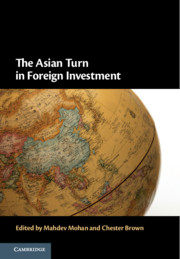Book contents
- The Asian Turn in Foreign Investment
- The Asian Turn in Foreign Investment
- Copyright page
- Contents
- Figures
- Tables
- Contributors
- Acknowledgements
- Table of Cases
- Table of Treaties
- Abbreviations
- Part I Introduction
- Part II National Approaches within Asia to the Regulation and Protection of Foreign Investment
- Part III The Rebalancing of Regulatory Space and Investor Protection in Asia
- 7 Regulatory Power and Investors’ Interests
- 8 Investment Agreements and Regulatory Space in Indonesia
- 9 Regulation of Foreign Investments in India
- 10 The Regulation of Foreign Investments in Sri Lanka
- Part IV Multilateral Rule-Making in Asia on Trade and Investment: From ASEAN to the Comprehensive and Progressive Agreement for Trans-Pacific Partnership
- Part V Emerging Issues
- Part VI What Lies Ahead?
- Index
7 - Regulatory Power and Investors’ Interests
Striking a Balance in Investment Treaties Concluded by Japan
from Part III - The Rebalancing of Regulatory Space and Investor Protection in Asia
Published online by Cambridge University Press: 13 August 2021
- The Asian Turn in Foreign Investment
- The Asian Turn in Foreign Investment
- Copyright page
- Contents
- Figures
- Tables
- Contributors
- Acknowledgements
- Table of Cases
- Table of Treaties
- Abbreviations
- Part I Introduction
- Part II National Approaches within Asia to the Regulation and Protection of Foreign Investment
- Part III The Rebalancing of Regulatory Space and Investor Protection in Asia
- 7 Regulatory Power and Investors’ Interests
- 8 Investment Agreements and Regulatory Space in Indonesia
- 9 Regulation of Foreign Investments in India
- 10 The Regulation of Foreign Investments in Sri Lanka
- Part IV Multilateral Rule-Making in Asia on Trade and Investment: From ASEAN to the Comprehensive and Progressive Agreement for Trans-Pacific Partnership
- Part V Emerging Issues
- Part VI What Lies Ahead?
- Index
Summary
Japan started to conclude detailed "new-generation" treaties in 2002, many of which contain provisions on the protection of regulatory space of the host State, taking into account the evolution of arbitral jurisprudence. The present chapter summarizes Japan’s inconsistent treaty practice concerning the protection of the regulatory space of the host State and analyses the rationale underlying this apparent inconsistency. Japan’s treaty practice suggests that restriction of the FET clause or the indirect expropriation clause, which may be politically required, is not necessarily so from a strictly legal point of view. This is perhaps because Japan has confidence in the evolution of the arbitral jurisprudence, which has been prudent enough to ensure that the regulatory space of the host State is not adversely affected by the application of an FET clause, whether autonomous or linked to customary international law, or the clause on indirect expropriation. Japan’s optimistic attitude may be explained by the fact that it has not been respondent in investment arbitration and may change when it is brought to arbitration, and is ordered to pay a hefty sum in damages to a foreign investor.
- Type
- Chapter
- Information
- The Asian Turn in Foreign Investment , pp. 103 - 117Publisher: Cambridge University PressPrint publication year: 2021

